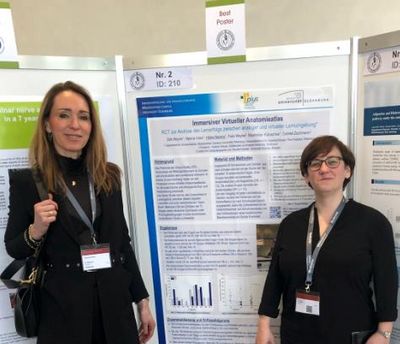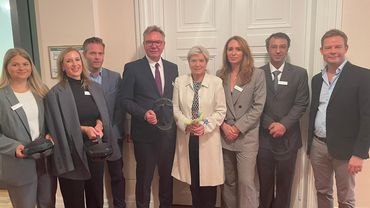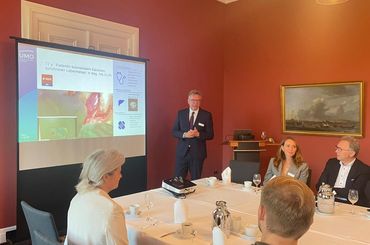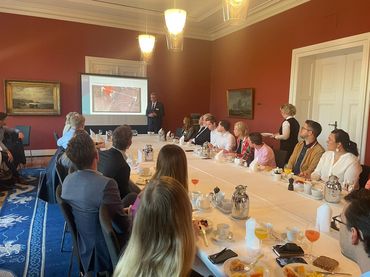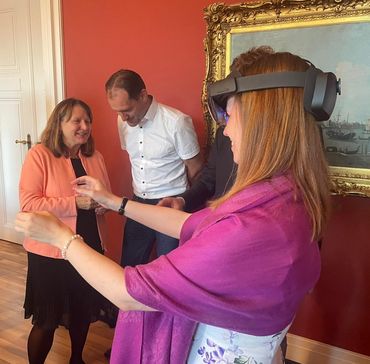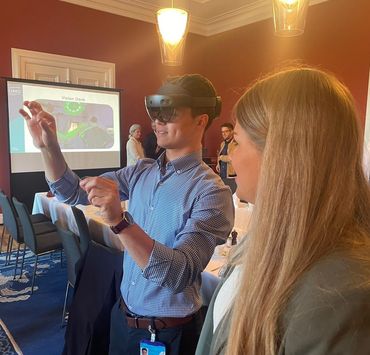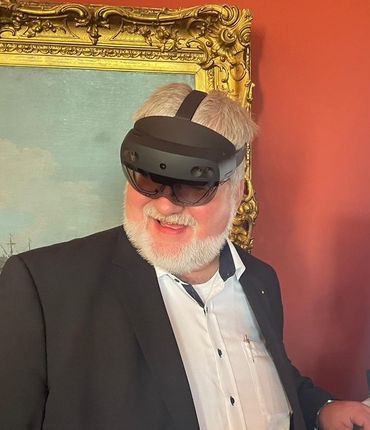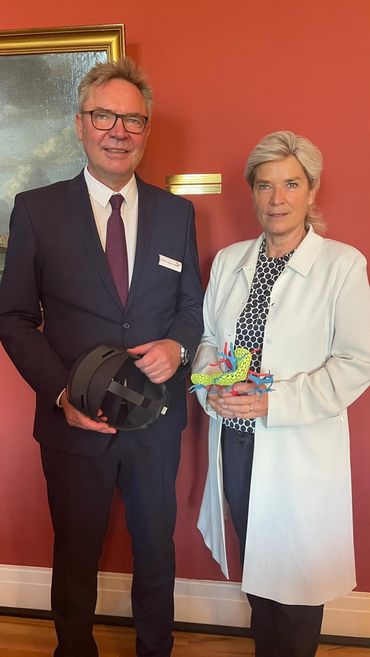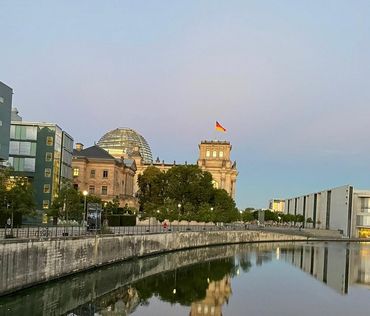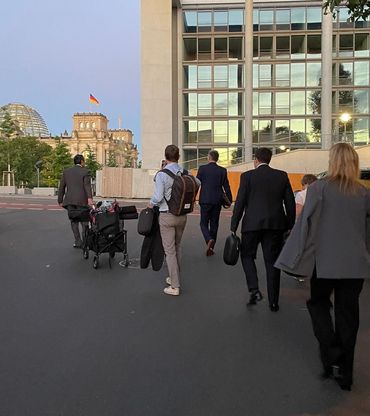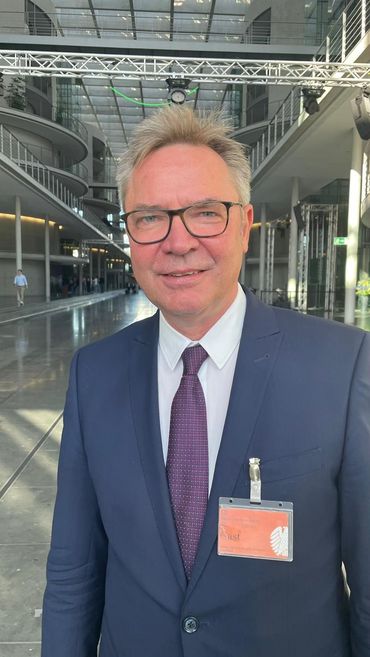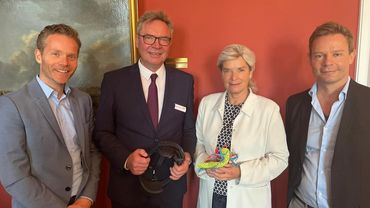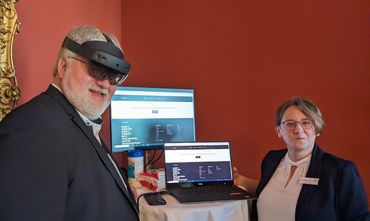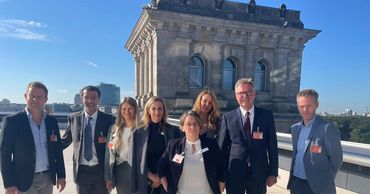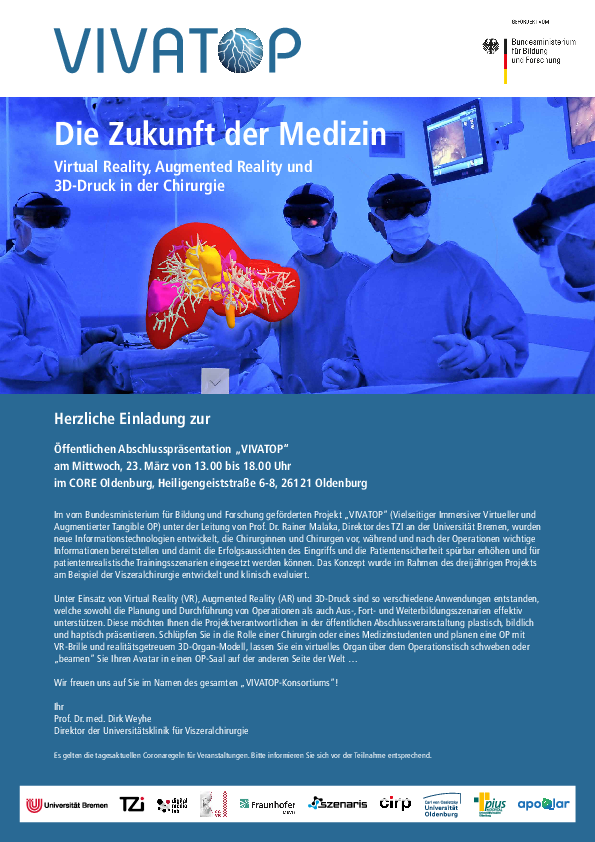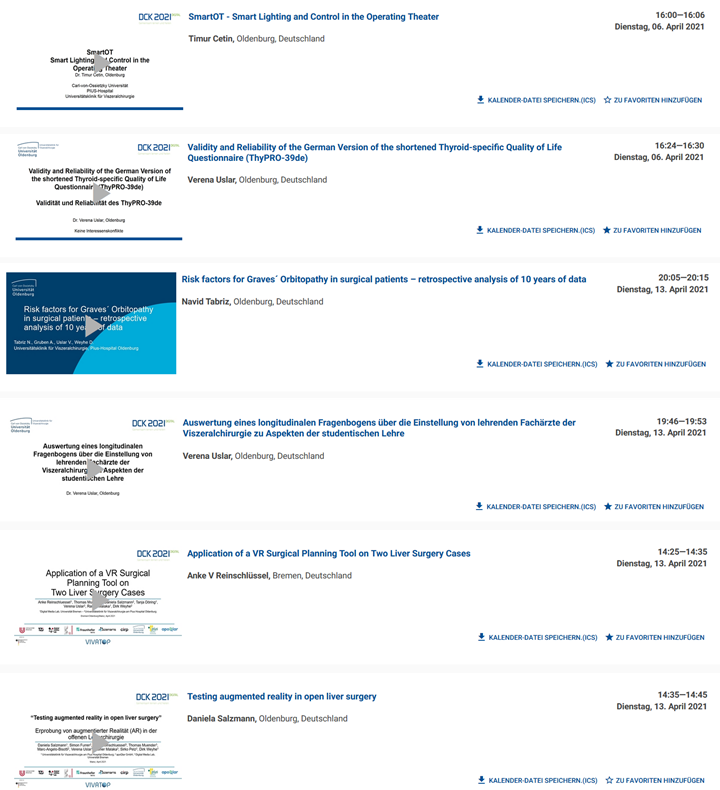News
News
Be part of the InterSurge 2025 on 21 and 22 November in Oldenburg
Registration for InterSurge is now open. We look forward to numerous participants and lively discussions
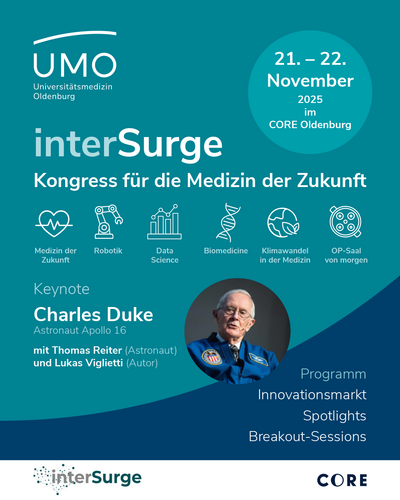
Together with Prof Dr Dirk Weyhe and Prof Dr Max Ettinger, we are creating a new platform that brings together experts from medicine, science, technology, business and politics. The aim is to provide impetus for a sustainable, networked and patient-centred healthcare system.
Further information can be found here: InterSurge information and registration
Dirk Weyhe received the German Medical Award 2025
Prof Dr Dirk Weyhe, Director of the University Clinic for Visceral Surgery at Pius Hospital, has received the German Medical Award 2025 in Gold in the Diagnostics category.
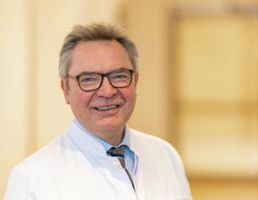
The award ceremony took place on 9 October 2025 at the Haus der Ärzteschaft in Düsseldorf and was accompanied by a medical innovation forum.
With this award, the jury of the German Medical Award recognises Prof. Weyhe's special achievements in the field of medical diagnostics with his innovative approaches to improving diagnostic precision in complex clinical pictures as well as his interdisciplinary commitment in research and clinical practice.
Our team conducts intensive research into pioneering procedures in which radiological image data is converted into three-dimensional holograms or virtual environments using mixed reality and virtual reality technologies. This allows surgeons, for example, to view patients' organs virtually in space before an operation and plan procedures precisely.
AI-supported systems are also used to support diagnostic processes. They analyse extensive medical data, recognise relevant patterns and provide precise decision-making aids for individual treatment planning. In combination with immersive technologies such as mixed and virtual reality as well as robot-assisted procedures, new possibilities are emerging to make complex interventions even safer and more efficient.
The German Medical Award has been presented annually since 2015 and is one of the most important awards in the German-speaking healthcare sector. The prize is awarded by the German Medical Club e.V. The aim is to recognise outstanding achievements in medicine, research, digitalisation and patient care.
The independent jury is made up of respected medical professionals, industry experts and personalities from science and practice. It assesses the submissions according to their innovative strength, patient-orientation and lasting impact on medical care. The award is presented in various categories, including: Diagnostics, Innovative Medicine and Therapies, Digital Health and Telemedicine, Prevention and Health Promotion, Patient Management and Communication, Medical Devices and Technical Innovation, Practice and Clinic Management, Promotion of Young Talent, Medical Women of the Year.
Inauguration of our Living Lab by Minister Andreas Phillipi
On 25 April, our new Living Lab was inaugurated on the premises of Pius Hospital in the presence of Minister Dr Andreas Phillipi. Further information can be found here.
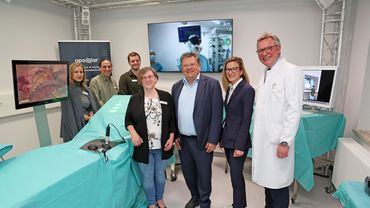
The University Department of Visceral Surgery at the Hannover Messe
From 31 March to 4 April, we were able to represent the University of Oldenburg at the research exihibition stand of the state of Lower Saxony. This led to many interesting encounters and discussions.
Operating with X-ray vision
Interview with Prof. Weyhe in the magazine f&w
In the current issue of the magazine f&w - führen und Wirtschaften im Krankenhaus, Prof. Weyhe was interviewed on the topic of holomedicine - operating with X-ray vision. The article was published in the November 2023 issue.
Lesson in digital medicine for members of the Bundestag on 21.09.2023
What are and how do virtual, augmented and mixed reality work in medicine? With the answers and comprehensive illustrative material in his luggage, Prof. Dr. med. Dirk Weyhe and his working group from the University Clinic for Visceral Surgery at Pius Hospital traveled to the Parliamentary Society in Berlin at the end of September. There he presented his innovative field of research and its clinical application to interested members of the Bundestag at a so-called parliamentary breakfast.
Around 30 guests accepted the invitation on the initiative of MP Simone Borchardt, including members of the Bundestag from all democratic parliamentary groups. They listened attentively to Dirk Weyhe's presentation. After all, this was about nothing less than the future of surgery. As one of the pioneers in Germany, the specialist in the field of visceral oncology surgery is researching the field of holomedicine in clinical use and, together with his team, is contributing to decisive further developments. Using patient-specific CT data, three-dimensional holograms can be generated and projected onto the site during an operation. This means that tumours can be visualized much better and thus operated on more precisely. This is because anatomical and physiological structures and special features are already visible when planning an operation, which in turn means greater safety for patients. Junior doctors also benefit from the new possibilities. They can use the models to practice operations virtually.
Research is also being carried out into using the new technologies to further advance telemedicine. For example, it is possible for surgeons to go to operations in other parts of the country or countries as avatars in order to provide support there. "Particularly against the backdrop of hospital closures, such as those predicted in Germany, it will be possible to offer telemedicine services in the future if certain local care structures are no longer available," reports Prof. Dirk Weyhe. "Although this is currently being implemented as part of research projects, policymakers should of course already be informed about such options today in order to make healthcare policy digital and future-proof. It is also urgently necessary to provide the appropriate funding for further research, development and the establishment of IT structures in order to further expand our current great lead in the field of holomedicine in Germany," said Weyhe's message in Berlin. The founders of the Hamburg-based software specialist apoQlar, whose software developments for the Microsoft HoloLens enable doctors to use the new methods, had also traveled there. The parliamentarians were able to test these in the form of various devices such as VR and AR glasses and speak directly with colleagues from Singapore in a live connection as an avatar in an operating theater metaverse.
VIVATOP at NDR Visite
NDR Visite visited us and our VIVATOP project partners. The resulting report is available in the ARD media library.
Insight into our current research projects
The current issue of Insights
For all those who are curious about our current research projects, here is the article about the Department of Visceral Surgery in the current issue of Insights
Prof. Dr. Dirk Weyhe is one of the founding members of the Holomedicine Association
On Saturday 27.11.21, Prof. Dr. Dirk Weyhe was presented with the certificate for the Pius Hospital as one of only 3 Holomedicine Centers of Excellence (HCoE) worldwide in an official ceremony at the inaugural summit of the Holomedicine Association. As one of 40 founding members of the Holomedicine Association, Prof. Weyhe is committed to improving patient safety by establishing holomedicine in the areas of diagnosis, patient education, surgical planning, collegial consultation and the performance of surgery. The only downer was the fact that the award ceremony could not take place in Singapore due to the CORONA pandemic.
Further information on the Holomedicine Association can be found here.
Final meeting BMBF-VIVATOP
AR, VR and 3D printing: how this fits together and changes the surgical care of patients in the long term will be presented at the final meeting of our BMBF project VIVATOP on 23.03.22 between 1 and 6 p.m. as part of an open day.
If you are interested, we kindly ask you to register informally at [email protected] in order to comply with the CORONA guidelines.
Publication of our research pool-funded, randomized-controlled pPRP study
Our publication on micronutrient supply in patients with pancreatic cancer was published by Scientific Reports on September 16, 2021. The study was funded by the research pool of the Faculty of Medicine. The paper can be found here.
Prof. Weyhe's interview with the magazine "medical designs"
Prof. Dr. Weyhe was interviewed as part of the theme week "In the OR of the future" of the magazine "medical designs" on the possible applications of immersive technologies such as AR and VR in the field of visceral surgery. The full interview can be found here.
The VIVATOP project also presents some of the development results in this context.
Doctoral colloquium spring 2021
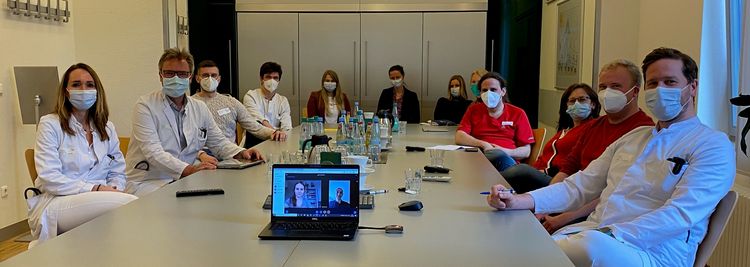
Our regular doctoral student colloquium took place again on May 18. In a mixture of online and face-to-face events, the following doctoral students gave insights into the current status of their work:
- Fynn Piastowski: Quality of life of female patients of working age after surgical treatment of an inguinal hernia (QuaLiHern)
- Pavel Gladki: Influence of the corona pandemic on the reality of visceral surgical care - a bicenter study
- Dmitry Khmara: TEP after recurrence of initial TAP or TAPP in inguinal hernias
- Amelie Damann:Neural correlates of expert cognition during laparoscopic simulation - an EEG study
- Dennis Fried: Preoperative magnesium and calcium supplementation in thyroid patients - RCT
- Lilo Stroink: longitudinal measurement of vitamin D levels in hospital staff
Many thanks for the high-quality and interesting presentations, which represent only a small part of the research activities at the Department of Visceral Surgery.
The next colloquium is planned for the fall of this year. Medical students are also welcome to attend and gain a better insight into our research activities. If you are interested, please contact Dr. Verena Uslar.
Bachelor's or Master's thesis to be awarded
EEG measurement of bound attention during preoperative planning of surgery with AR and VR
Virtual and augmented reality (VR and AR) are increasingly being used to support the
preparation and performance of operations. In terms of preparation, the main point of interest is
which method leads to better results or, for the same results,
which is easier to use, requires less attention and generates less cognitive load
.
Doctors and medical staff in training should plan several liver resections using the available VR and AR systems
. In addition, they should be able to react to an acoustic oddball with a
keystroke if they can sufficiently
divert their attention from the main task. The performance in this secondary task and the EEG signals measured
during this task are used to determine the
attention engaged by the primary task. In addition, subjects rate their cognitive load in
self-report.
Beyond this research objective, this series of experiments serves to test the measurement of EEG
during the use of VR and AR, and to establish a measurement and evaluation protocol.
These will be a necessary basis for future measurements in this field.
The results of the study will be published in relevant journals
after peer review.
The work will be jointly supervised by academic staff from the University Hospital and staff from the Department of Psychology. We are looking for a person with a background in neuropsychology or physics, engineering, medicine. The work can be carried out at both Bachelor's and Master's thesis level.
Virtual status meeting of the VIVATOP project
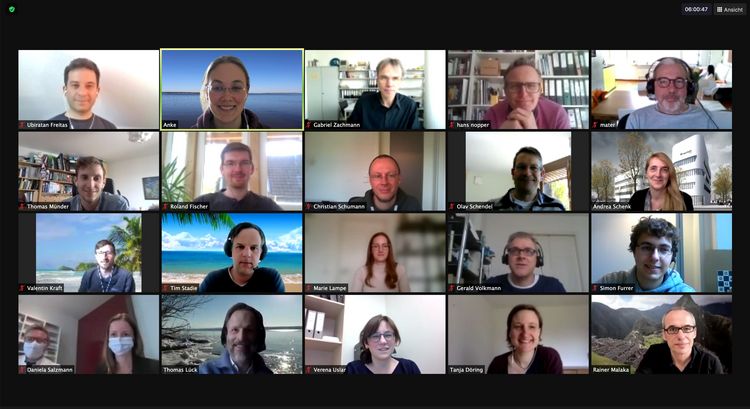
For the 3rd time now, our consortium meeting for the VIVATOP project unfortunately had to take place virtually. Nevertheless, we had a productive meeting with all partners & a short visit from the project sponsor @VDIVDE_IT and we look forward to the rest of the project with confidence! For up-to-date information, you can also follow us on Twitter (@vivatop_en).
The University Hospital at the virtual German Congress of Surgeons 2021
Four members of staff from the Department of Visceral Surgery successfully presented five papers at the first virtual German Congress of Surgeons.
In the pre-congress, Dr. Timur Cetin and Dr. Verena Uslar reported on the BMBF project SmartOT and the establishment of a German questionnaire to measure quality of life in thyroid patients.
The presentation by Dr. Navid Tabriz in the session for the best abstracts of the DCK was also dedicated to the thyroid gland and Dr. Verena Uslar presented another lecture on teaching in the operating room.
There were two presentations from the VIVATOP project; one by our colleague Dr. Daniela Salzmann and one by our project partner Anke Reinschlüssel from the University of Bremen (Digital Media Lab).
Unfortunately, the presentations are no longer accessible. However, you can find an overview here:
Pius Hospital researches the OR of the future
The Smart-OT ("Intelligent Operating Room") project is researching how innovative, so-called smart lighting and control concepts, which are to be linked interactively and holistically, can ensure greater quality, safety, ergonomics and efficiency in operating room processes. The aim is to reduce the workload of OR staff and ultimately increase patient safety. To this end, the demonstrators are tested in simulated operations in as realistic an environment as possible.
To this end, the Pius Hospital team, led by Prof. Dr. Dirk Weyhe, Director of the University Clinic for Visceral Surgery, is setting up a laboratory specially designed for such research questions, in which operations can be simulated and work processes in the operating room can be researched. In addition to the Pius Hospital, the companies Dr. Mach GmbH & Co. KG (project manager), Qioptiq GmbH & Co. KG and KIZMO GmbH are involved in the project. The University of Bremen is also involved with the Digital Media and Computer Graphics and Virtual Reality working groups. The project runs until 30.9.2021 and is funded with 1.2 million euros by the Federal Ministry of Education and Research (BMBF). At the end of last year, the initiators entered the intensive project phase in the form of a kick-off event.
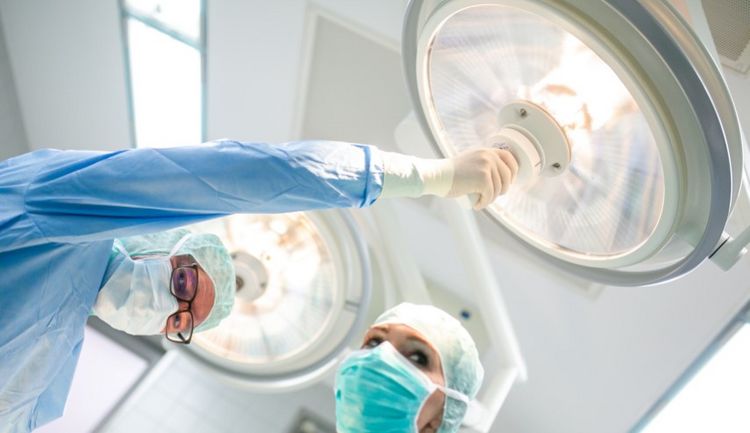
VIVATOP at the European Hernia Society Congress in Hamburg
A look at everyday surgery in German clinics shows that work is still mostly carried out using a computer, keyboard and mouse. Surgery planning is based on 2D images on the screen. This can lead to problems during the operation. This is where the VIVATOP project, funded by the BMBF and involving the University Clinic for Visceral Surgery at Pius Hospital, comes in. Using modern techniques for virtual and augmented reality (VR/AR) and 3D printing, the aim is to simplify surgical planning and execution and make training more realistic. The basis for this is the patients' current image data. At the annual congress of the European Hernia Society in Hamburg in mid-September, the project participants from Pius Hospital, the University of Bremen, apoQlar GmbH and the Fraunhofer Institute presented the project and its initial results at an exhibition stand in order to raise awareness of the project among other potential partners for follow-up projects. Congress President Dr. Wolfgang Reinpold from Hamburg also stopped by to inspect the fascinating new possibilities and try them out for himself.
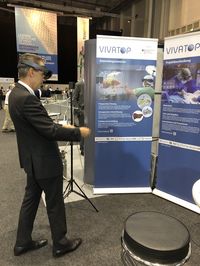
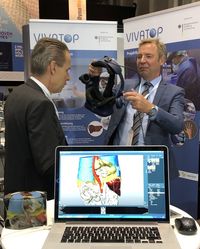
Journalistic platform reports on VIVATOP project
The BMBF project VIVATOP, in which the University Clinic for Visceral Surgery is involved, was described on "Innovation Origins", an independent journalistic platform: https://innovationorigins.com/de/vivatop-wie-vr-und-3d-druck-chirurgen-unterstuetzen/
VIVATOP stands for "Versatile Immersive Virtual and Augmented Tangible OR". The project combines model organs from the 3D printer with applications from VR and augmented reality. The aim is to improve the planning of operations and reduce risks for patients.
As preliminary work for this large joint project, the University Department of Visceral Surgery and the Computer Graphics Group of the Technology Center for Informatics and Information Technology (TZI) have developed an immersive anatomy atlas in a virtual environment.
PhD student exhibited at World-CUR
The second World Congress on Undergraduate Research (World CUR) took place at the University of Oldenburg from May 23 to 25, 2019(uol.de/en/worldcur2019/). Around 400 students from 35 countries gave insights into their research work in numerous lectures and poster presentations.
The young doctor Johannes Grone, a doctoral student at the University Clinic for Visceral Surgery and former student of the European Medical School Oldenburg-Groningen, also successfully presented the results of his work at the congress. He is working on the "Influence of the BRAF mutation on the outcome of thyroid carcinoma".
The BRAF V600E mutation (BRAF+) is the most common genetic cause of papillary thyroid carcinoma (PTC) and can occur in up to 80 percent of cases. Some studies show that the detection of a BRAF V600E mutation as a characteristic of a more aggressive tumor is associated with a higher probability of recurrence and lymph node metastases, so that a more extensive surgical strategy should be pursued in the case of preoperative mutation detection in fine needle aspiration. However, the significance of this molecular diagnosis is still the subject of controversial debate. Johannes Grone analyzed 382 histological specimens from 2007-2016 and investigated the extent to which a BRAF mutation existed in his own collective and what influence positive mutation detection has on various outcome parameters.
The results with regard to malignant lymph nodes, tumor invasiveness and multifocality indicate that a BRAF mutation is associated with more aggressive tumor behavior, but does not affect the recurrence rate. If a BRAF mutation is positively detected in a fine needle aspiration, surgical therapy should follow. However, the extent of this operation remains unclear. Particularly with regard to microcarcinomas, it remains to be discussed to what extent BRAF+ microcarcinomas can be observed or whether resection should be extended in BRAF+ tumors.
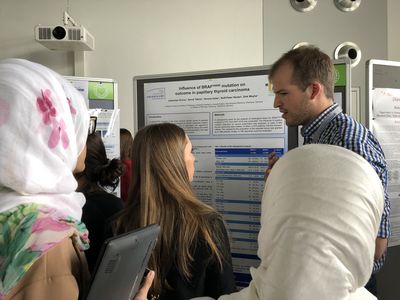
Best Poster Award won
The Department of Visceral Surgery won the "Best Poster Award" in one of the three categories of the German Society of Surgery at the 136th Congress of the German Society of Surgery.
Is it better to acquire anatomical knowledge the old-fashioned way with a book or in a virtual environment? This question was the subject of a project by the working group of PD Dr. Dirk Weyhe, University Department of Visceral Surgery. For this project, groups of students tried out both methods last year. The result - an interactive anatomy atlas actually appears to be superior to the classic book - was presented at the 136th Congress of the German Society of Surgery in Munich at the end of March. The corresponding presentation on a scientific poster received the "Best Poster" award, which the staff at the Department of Visceral Surgery were delighted with.
